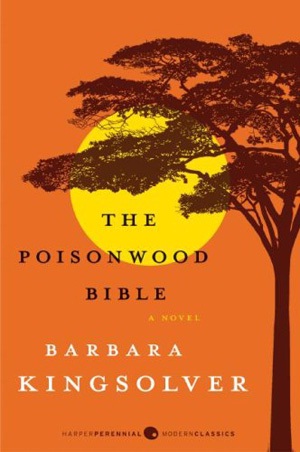
Book Review – The Poisonwood Bible by Barbara Kingsolver
The Poisonwood Bible by Barbara Kingsolver
Review by Jessica Dall
Some books are amazing, some are horrible, the vast majority are simply mediocre. The Poisonwood Bible, by Barbara Kingsolver, however, seems to be one of those rare books where skill and research should make it amazing, but it somehow misses the mark.
Starting in 1959, The Poisonwood Bible follows the Price family, Southern Baptists from Georgia, as they move to (what at the time is) the Belgian Congo as missionaries. From the beginning there is contention, it becoming clear that the father, Nathan Price, has strong handed his way into the post, dragging his less than enthusiastic wife, Orleanna, and four daughters—Rachel, Leah, Adah, and Ruth May—along for the ride. Following the five Price women, the book switches in between Orleanna, Rachel, Leah, Adah, and Ruth May’s viewpoints painting a clear picture of a dysfunctional family threatened to be torn apart by such a drastic change to their lives.
From the beginning, it is clear Kingsolver is a skilled writer. Switching between the five characters seemingly without a set pattern, each viewpoint is fully developed, five distinct voices rising out from five fully-developed characters. While each woman seems simple in many ways to define—vain Rachel, playful Ruth May, dutiful Orleanna—they are in no way defined by a singular characteristic that far too often leads to flat stock characters. Within moments, it is possible to believe that these are real characters sharing a story with you, not an author trying to tell their story.
Kingsolver’s involved research, and personal experience with the African continent, adds to this all-encompassing immersion into a world that will tend to be as foreign to the reader as it is for the Price women. It’s possible to feel the sticky heat of the rainy season in the jungle, feel a mass of giant ants as they move through the small African village. The entire world comes with a level of reality that is much too often lacking in novels. As a whole, it would be hard to call Kingsolver’s writing anything but superb.
Unfortunately, even with the quality of writing and emotional storyline, The Poisonwood Bible seems to miss its mark in truly leaving an impact. Even with five different, realistic characters giving you their sides of the story, it’s hard to connect with any of them. Where most stories telling the story of a group of women allow the reader to connect with at least one or two, none of the characters come off as especially likeable. As well-rounded as they are, it’s hard to hate any of them, especially when they all get the chance to explain their sides, but it’s equally hard to love any of them. Without a connection to any particular character, it’s hard to fully share in their hardship. Where their despair should be the reader’s despair, their triumphs the reader’s triumphs, it instead leaves a passing interest or feeling of pity, nothing more. This effect is even more pronounced with the characters the reader is obviously supposed to dislike. Again, it doesn’t seem possible to feel so strongly as to hate the characters, but their unagreeable personalities leave them simply annoying. Hate would arguably be better.
As a whole, The Poisonwood Bible is a cut above the vast majority of novel. It would be difficult to call it mediocre by any stretch. However, lacking an emotional connection to any of the characters, it is difficult to fully take advantage of Kingsolver’s brilliant writing and realistic setting. Still, The Poisonwood Bible gives an interesting peak into the lives of a family thrown into turmoil in the Belgian Congo, giving readers an enjoyable, if not amazing, read.
The Poisonwood Bible (1998) is available through Harper Perennial in both paperback and ebook.
